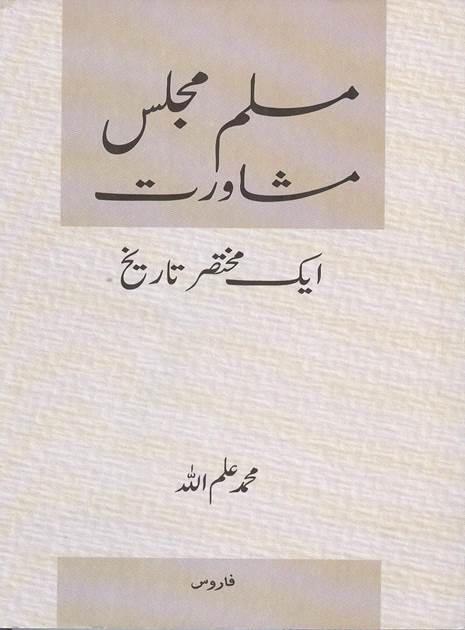Muslim Majlis e Mushawarat on its Deathbed
By Dr Aslam Abdullah
CA


Muslim Majlis e Mushawarat (The Muslim Consultative Assembly) of India is on its deathbed. It lives on borrowed breathing and survives on extreme self-deceptive morphine its leaders force its members to take daily. It has lost its past aura, deviated from its role as a consultative body of Muslim organizations and intellectuals, and replaced it with a wrestling arena of conflicting egos.
The fifty-eight-year-old organization was a gift of Muslim intellectuals, visionaries, and activists to the community to carve a better future for its coming generations in a country that was slipping into the grip of bigotry and violence against religious minorities. It was a bold step to move toward the path of unity by maintaining diversity.
It emerged at a time when Muslims faced violence, discrimination, and injustice in almost all aspects of their life. Divisions among them on theological, political, and ethnic basis were standard. Religious organizations were hostile to each other, and the so-called secularists owed their allegiance to political parties for minor gains.
During these trying times, stalwarts like Maulana Abul Hassan Ali Nadwi, Dr Syed Mehmood, Maulana Abul Lais, and Maulana Muhammad Muslim weaved a progressive vision rooted in the divine principle of consultation. They invited Muslim intellectuals and leaders of their organization to come under one tent, maintaining their identities and leading the community through consultative measures. They specified four areas of work for the community.
- Members of the Majlis would deliberate upon the community affairs and help the community develop a pragmatic approach through evolving consensus.
- Members of the Majlis would motivate the community to interact with other religious communities to promote peace and harmony.
- The Mushawarat would prepare the community to participate in serving the people at large, regardless of their religious or ethnic background.
- The Mushawarat constituents would help the community to forge unity at all levels by avoiding debates and issues on trivial matters.
The Mushawarat was a turning point in the history of Muslims of India. It offered hope and progress to a community that was losing confidence in its ability to face challenges. As a result, many non-Muslims joined the movement, and millions greeted emerging leaders when they visited different parts of the country. Finally, it appeared that the Musahwart would succeed in helping Muslims find the elusive unity and purpose of collective work.
But, there is always a but behind the decline of any successful movement; egos overcame sincerity, organizational rivalries dominated the agenda, basic immature ideas destroyed professionalism, and political interventions at the behest of vested interest groups became a norm.
The leadership slipped into the hands of those who used it rather than serving it. The religious parties played their part in the mess created by self-serving leaders. The Mushawarat is now like a marsh, wet, muddy with no firm ground to stand.
It has no consultative process. It has made no efforts to engage non-Muslims in building peace and harmony. It lacks the vision to serve others, and its leaders manipulate its members by concocting facts and fabricating stories.
It is an organization without enthusiastic, visionary leadership. Instead, it announces its existence by issuing meaningless statements and indulging in promoting infighting among its constituents. Its bylaws are in cold storage. Not many members know they exist, and those who have access to them do not show loyalty.
It has a non-functional office, and it has a non-existence budget. As a result, accountability is minimal, and the community's welfare is far from its radar.
For all practical purposes, the Mushawarat is dead. But this does not mean that the community is quiet, too. On the contrary, with wounds inside its soul and injuries all over its body, the community still longs for the path the visionaries set in 1964.
The community looks for leadership to initiate a consultative process to address their real issues.
It longs for a Muslim initiative to connect with non-Muslims for peace and harmony.
The community seeks direction in organizing social welfare programs beyond its reach, and finally, it wants its leaders to subdue their egos and minimize their differences for a better future.
The allegations and counter-accusations that rival Mushawarat groups have hurled against each other indicate that they are deaf, dumb, and blind. Something extraordinary needs to happen to make Mushawarat active. But unfortunately, the current leadership cannot lead the community to the right decisions. Instead, it is pushing them to a pitiless ditch filled with the blood and bones of the dead. But there is still some hope from those professional Muslims who understand the mechanism of organizing a mass movement based on consultation. Will they step up? That is the question many have on their mind.
(Dr Aslam Abdullah is a resident scholar at Islamicity.org and editor-in-chief of the Muslim Observer newspaper. He is also the Indian Islamic Heritage Project director of the American Federation of Muslims of Indian origin and the interim President of the World Council of Muslims for Interfaith Relations, WCMIR.)

